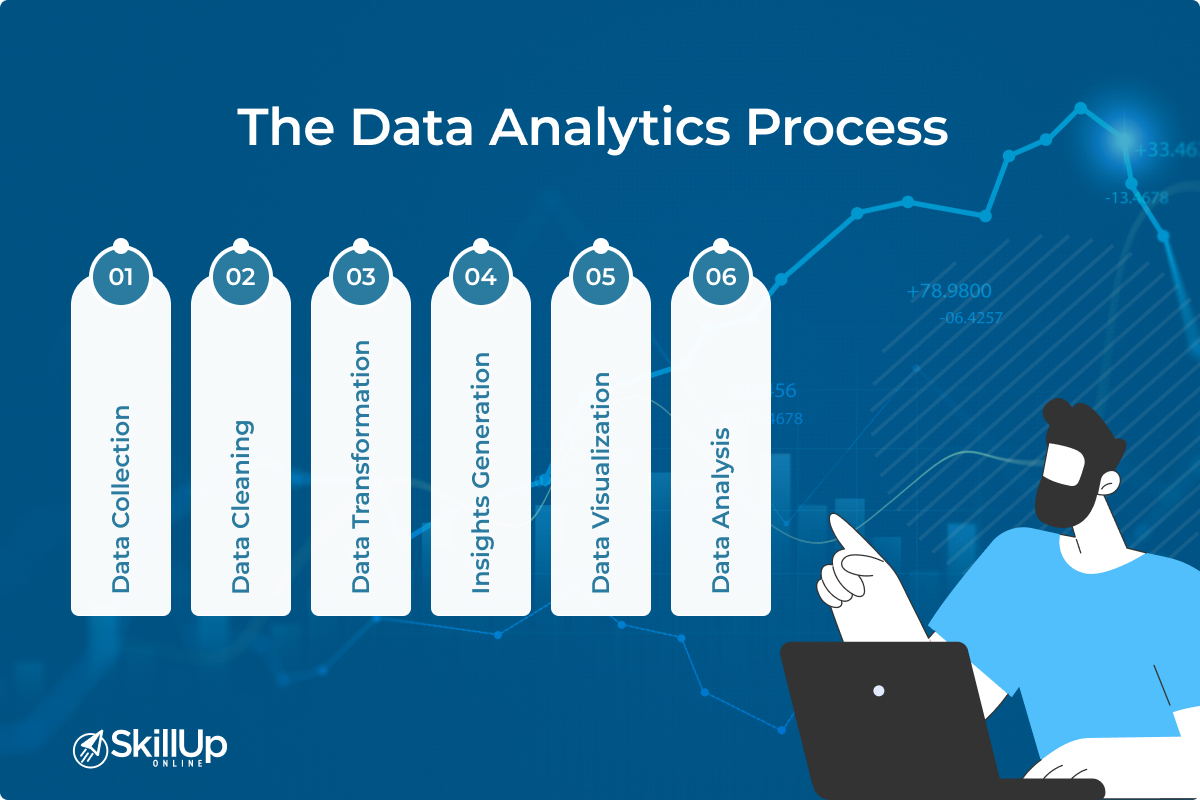Imagine diving into the world of data, where you become the detective solving mysteries hidden within mountains of information. This is exactly what being a data analyst does. As big data continues to dominate all industries, including healthcare, finance, and marketing, the demand for skilled data analysts is skyrocketing. Companies are eagerly seeking experts who can untangle complex datasets and transform them into actionable insights that guide their decision-making.

According to a report by the US Bureau of Labor Statistics, employment in data analyst jobs will witness a massive growth of 23% between the year 2021 to 2031, much faster than the average of all occupations. The report also states that organizations are increasingly relying on data analysis to make informed business decisions, leading to a surge in demand for professionals with expertise in this area.
A career as a data analyst promises not only rewarding challenges, therefore, but also high earning potential. According to a report by Glassdoor, the average salary of a data analyst in the US is around $65,581 per year (with some hitting as high as $87,711 per year). With such promising career prospects, pursuing a career as a data analyst is an excellent choice if you want to enter the tech industry. However, to seize this opportunity, you need more than just a generic skill set or an IT degree.
So, how do you get there? Let’s explore the skills you need to get rolling.\
What is a Data Analyst?
Before we look at the skills in detail, let’s quickly cover the basics and understand what a data analyst is. Simply put, a data analyst is a professional who collects, organizes, analyzes, and interprets large sets of data to extract valuable insights and inform decision-making processes. They play a crucial role in helping organizations make data-driven decisions, solve complex problems, and identify patterns and trends that can drive business growth and optimize operations.
As a data analyst, you’ll be responsible for cleaning and preparing data for analysis, performing exploratory data analysis, applying statistical models, creating data visualizations, and generating reports or presentations to communicate findings to stakeholders.
Top Ten Skills to Become a Data Analyst
Recruiters are looking for professionals with a blend of specific technical and human skills. So, let’s look at the top ten skills you need to become a successful data analyst:
- Data Manipulation: This involves cleaning, transforming, and organizing complex datasets. Raw data often comes in messy and unstructured formats, and you need to be skilled in using tools like SQL (structured query language) or Python to extract the relevant information, remove inconsistencies, and format the data in a consistent manner.
- Statistical Analysis: Statistical analysis is a fundamental skill for data analysts as it is used to extract valuable insights from data. It involves applying statistical methods and techniques to analyze data, identify patterns, and draw meaningful conclusions. This skill allows you to go beyond simple observations and uncover deeper insights that can drive informed decision-making.
- Data Visualization: Data visualization plays a vital role in data analysis as it involves presenting data in a visual format through charts, graphs, and dashboards. Proficiency in data visualization tools like Tableau, Power BI, or Python libraries such as Matplotlib and Seaborn empowers data analysts to design compelling visualizations that enhance data understanding and engagement.
- Programming Skills: An understanding of programming is essential as it enables you to efficiently perform data analysis tasks, automate processes, and build statistical models. Proficiency in programming languages such as Python or R will enable you to manipulate, analyze, and visualize data effectively.
- Database Management: Data analysts need to be proficient in database management systems (DBMS), such as SQL, to design and implement databases, create queries, and retrieve relevant data for analysis. So, proficiency in database management will allow you to efficiently handle large volumes of data, perform complex queries, and join tables to extract valuable insights.
- Machine Learning: As a data analyst, you need to be skilled in machine learning techniques that can leverage algorithms such as decision trees, random forests, logistic regression, or neural networks to analyze complex datasets and make predictions or classifications. Machine learning allows you to work on tasks like feature engineering, model evaluation, and model selection to ensure the robustness and effectiveness of the predictive models you develop.
- Critical Thinking: Critical thinking is a vital competency for data analysts as it allows you to approach problems analytically, think logically, and make informed decisions based on data-driven insights. As a data analyst, you should be able to analyze complex situations, evaluate information objectively, and draw logical conclusions.
- Business Acumen: Data analysts with strong business acumen have a deep understanding of the industry trends, market dynamics, and key performance indicators (KPIs) relevant to their organization. As a data analyst, you need to align your analysis with business objectives and use data insights to drive strategic decision-making and improve operational efficiency and bring out solutions.
- Communication Skills: Strong communication skills are essential for data analysts as they enable you to effectively convey complex findings and insights to both technical and non-technical stakeholders. As a data analyst, you should have the storytelling skills to effectively communicate stacks of data. And you should be able to articulate data analysis results, present visualizations, and clearly explain the implications and recommendations derived from the data.
- Continuous Learning: This is a key attribute for data analysts as it involves staying updated with the latest tools, technologies, and industry trends in the field of data analysis. Continuous learning enables you to adapt to evolving data landscapes, expand your knowledge, and enhance your analytical capabilities.
One way to hone these skills is via certifications. A regular college degree often fails to provide the skills that recruiters are hunting for, and this is where online certifications come to the rescue. For instance, if you want to learn data visualization tools like Tableau, you can take a Tableau data analyst course. Similarly, to get an understanding of Apache SystemML (a machine learning platform), you can take a course on machine learning with Apache SystemML. You can also take industry-recognized certificate courses in SQL, Python, Power BI, etc.

Next Steps
Aiming for a career as a data analyst can be a rewarding choice if you want to enter a rapidly growing field. By mastering essential tools, staying updated with the latest technologies, and nurturing a growth mindset, you can position yourself for success. So, whether you’re passionate about solving complex problems, love working with numbers, or have an insatiable curiosity, pursuing a career as a data analyst can be a rewarding choice.
If you would like to know more about how you can build skills and get started in the exciting world of data analytics, contact our Learner Support Team at [email protected]. They will be more than happy to guide you on your next steps.





